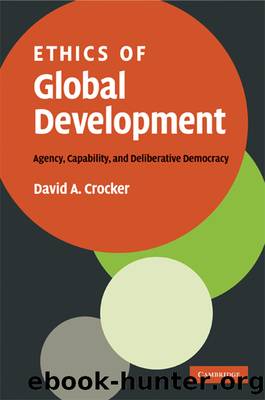Ethics of Global Development by David A. Crocker

Author:David A. Crocker
Language: eng
Format: epub
Publisher: Cambridge University Press
Published: 2013-02-14T16:00:00+00:00
One of the ways open to these active citizens is that of the central capability of controlling their environment, including âbeing able to participate effectively in political choices that govern oneâs life; having the right of political participation, protections of free speech and association.â81
There is much with which to agree in these passages, but it is notable that Nussbaumâs focus is on individual agency to shape oneâs life through personal choice rather than on the collective choice of political values (for instance, valued capabilities and functionings) and policies. Although Nussbaum does include in her central capabilities the individualâs capability and right to participate politically, the emphasis is on the individualâs political rights rather on two themes increasingly prominent in Sen. Sen emphasizes each citizenâs âsocial commitmentâ to deliberate and decide policy together as well as the important role of political freedom in furthering public debate, rational scrutiny of options, and social choice of priorities: âOne of the strongest arguments in favor of political freedom lies precisely in the opportunity it gives citizens to discuss and debate â and to participate in the selection of â values in the choice of priorities.â82
Nussbaum does ample justice to one side of the âtwoâway relationâ between individual freedom and societal arrangements, namely, the way in which social arrangements and political actions can and should âexpand individual freedoms.â She misses, however, Senâs more capacious perspective in which individual freedoms âmake the social arrangements more appropriate and effective.â83 Sen is convinced that âthe direction of public policy can be influenced by the effective use of participatory capabilities by the public.â84 Whether deliberating collectively as citizens of a polity or as members of an association, individuals acting collaboratively and through public discussion shape their preferences and arrive at remedies to practical problems.
We drive home the difference between Sen and Nussbaum on this point in relation to Nussbaumâs oneâsided interpretation of a recent idea of Senâs. In âFreedom and Needs,â Sen says: âPolitical rights are important not only for the fulfillment of needs, they are crucial also for the formulation of needs. And this idea relates, in the end, to the respect that we owe each other as fellow human beings.â85 Nussbaum interprets this passage as meaning exclusively that each citizen has the right to decide on her own needs and whether to avail herself of government provisioning. Sen, however, by the âconstructive roleâ of âbasic political and liberal rights,â also means that âour conceptualization of economic [and other] needs depends crucially on open public debates and discussions, the guaranteeing of which requires insistence on basic political liberty and civil rights.â86
Download
This site does not store any files on its server. We only index and link to content provided by other sites. Please contact the content providers to delete copyright contents if any and email us, we'll remove relevant links or contents immediately.
Time Management Made Easy: How to Cultivate New Habits, Improve Productivity and Get Things Done by Joshua Strachan(2419)
The 7 Habits of Highly Effective People by Stephen R. Covey & Sean Covey(2268)
The Concise Laws of Human Nature by Robert Greene(1916)
Doesn't Hurt to Ask by Trey Gowdy(1640)
Primal Leadership by Daniel Goleman(1285)
Hook Point: How to Stand Out in a 3-Second World by Brendan Kane(1248)
Don't Sweat the Small Stuff...and It's All Small Stuff by Richard Carlson(1121)
HBR's 10 Must Reads 2021 by unknow(1098)
The Power of 100! by Shaun King(1098)
Amazon Unbound by Brad Stone(1046)
100 Things Successful People Do by Nigel Cumberland(1031)
Master of One by Jordan Raynor(1008)
HBR's 10 Must Reads 2021 by Harvard Business Review(1007)
The Job Closer by Steve Dalton(994)
Declutter Your Mind: A step by step guide to learn to control your thoughts, stop worrying, relieve anxiety and eliminate panic attacks and negative thinking by Mia Chandler(970)
Lives of the Stoics by Ryan Holiday & Stephen Hanselman(969)
Conflicted by Ian Leslie(873)
The Book of Hope by Jane Goodall(872)
Coders at Work: Reflections on the craft of programming by Peter Seibel(848)
